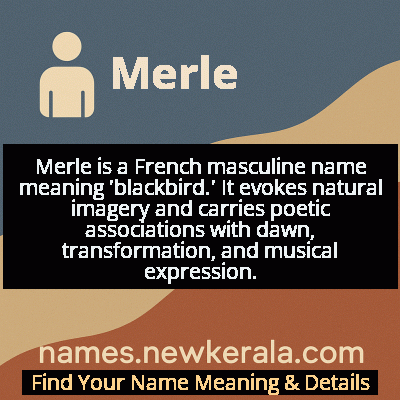Merle Name Meaning & Details
Origin, Popularity, Numerology Analysis & Name Meaning of Merle
Discover the origin, meaning, and cultural significance of the name MERLE. Delve into its historical roots and explore the lasting impact it has had on communities and traditions.
Name
Merle
Gender
Male
Origin
French
Lucky Number
8
Meaning of the Name - Merle
Merle is a French masculine name meaning 'blackbird.' It evokes natural imagery and carries poetic associations with dawn, transformation, and musical expression.
Merle - Complete Numerology Analysis
Your Numerology Number
Based on Pythagorean Numerology System
Ruling Planet
Saturn
Positive Nature
Ambitious, efficient, realistic, and authoritative.
Negative Traits
Materialistic, stressed, confrontational, and can be overly ambitious.
Lucky Colours
Dark blue, black.
Lucky Days
Saturday.
Lucky Stones
Blue sapphire, amethyst.
Harmony Numbers
2, 4, 6.
Best Suited Professions
Business leaders, managers, financial services, law enforcement.
What People Like About You
Leadership, determination, organizational skills.
Famous People Named Merle
Merle Haggard
Country singer-songwriter
Country Music Hall of Fame inductee known for hits like 'Mama Tried' and 'Okie from Muskogee'
Merle Oberon
Actress
Oscar-nominated actress known for roles in 'The Scarlet Pimpernel' and 'Wuthering Heights'
Merle Travis
Country musician
Influential guitarist who developed the 'Travis picking' style and wrote 'Sixteen Tons'
Merle Miller
Author and journalist
Noted for his biography of Harry Truman and pioneering gay rights writing
Name Variations & International Equivalents
Click on blue names to explore their detailed meanings. Gray names with will be available soon.
Cultural & Historical Significance
The name's journey to English-speaking countries occurred primarily in the early 20th century, where it maintained its masculine identity while sometimes being adopted for females as well. In French literature and poetry, the merle (blackbird) frequently appears as a symbol of dawn and renewal, adding poetic resonance to the name. The cultural significance extends to music and arts, where the name evokes a certain rustic elegance and connection to natural wisdom. In contemporary times, Merle carries a vintage charm that appeals to those seeking names with historical depth and natural symbolism.
Extended Personality Analysis
Individuals named Merle are often perceived as creative, observant, and independent thinkers. The blackbird symbolism suggests someone who is both grounded and capable of seeing things from a higher perspective—much like the bird that walks confidently on the earth yet can take flight to gain broader views. This duality often manifests as practical intelligence combined with artistic sensibility. Merles tend to be excellent communicators, possessing a natural musicality or verbal fluency that makes them compelling storytellers or performers.
They typically value their independence and may have a somewhat solitary streak, preferring deep connections with a few close companions rather than large social circles. Their observational skills make them keen judges of character, and they often possess an intuitive understanding of human nature. While they can be reserved in unfamiliar situations, those who know them well appreciate their loyalty, wit, and the surprising depth of their emotional world. The name suggests a person who moves through life with quiet confidence, often surprising others with their depth of insight and creative problem-solving abilities.
Modern Usage & Popularity
In contemporary times, Merle has become a relatively rare name, particularly for males, as it peaked in popularity during the early to mid-20th century. In the United States, the name was most popular between 1920-1950, consistently ranking within the top 500 male names during that period. Since the 1970s, its usage has declined significantly, making it an uncommon choice today. However, this rarity has created a vintage charm that appeals to parents seeking unique yet established names. The name maintains stronger recognition in rural and Southern communities, partly due to country music icon Merle Haggard's enduring legacy. Interestingly, while originally masculine in French tradition, Merle became more commonly used for females in English-speaking countries during its popularity peak, though recent trends show a slight resurgence of its masculine usage among parents interested in nature-inspired and vintage names.
Symbolic & Spiritual Meanings
Symbolically, Merle carries rich metaphorical meanings derived from its blackbird association. The blackbird represents transformation and the unknown, as it's often depicted as a messenger between worlds in Celtic and European mythology. Its dark plumage suggests mystery, intuition, and hidden knowledge, while its beautiful song symbolizes the expression of inner truth and creativity. The blackbird's ability to thrive in both ground and air environments represents adaptability and the balance between practical and spiritual realms. In alchemical traditions, the blackbird was associated with the nigredo phase—the initial stage of transformation where base materials are broken down before rebirth. This connects Merle to themes of resilience, personal growth, and the discovery of value in darkness or challenge. The bird's seasonal migrations also symbolize cycles, change, and the navigation of life's journeys with innate wisdom and grace.

